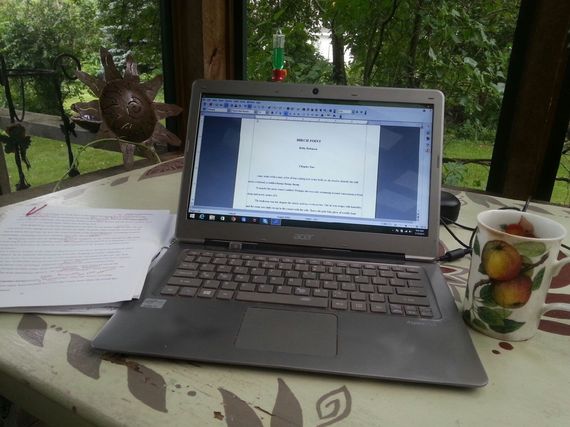Last weekend, I participated on two different author panels during the 2016 Newburyport Literary Festival, an event packed with over 70 different authors that drew 2,000 people to our tiny seaside town.
The panels were very different. In the morning, I joined Anita Diamant and Yona Zeldis McDonough in talking about writing in different genres. The afternoon panel--with Carla Panciera, Sarah Yaw and Myfanwy Collins--was devoted to writers publishing debut books after age forty. What struck me was that, during both Q&A sessions, many people asked a variation of the same question:
"How do you find time to write?"
That's the million-dollar question. Maybe you're working full time or have small kids at home. Maybe your husband is ill or your daughter's getting married. And, look! It's time to mulch the garden again!
The truth is, there are many reasons not to write. Life is busy and writing is hard. Putting words on a page takes discipline and patience. It's also an act of faith, one where you have to say, "Yeah, this is going to be really bad writing, but I'm going to put the words down anyway and fix them later."
How do you find time to write? You don't. You have to believe in yourself enough to make time to write.
That doesn't mean giving up your day job (though that would be lovely). Nor does it mean ignoring your family (at least not entirely).
What it does mean is finding a way to believe the effort is worthwhile, and giving yourself permission to fail. Then you start carving little blocks of time out of your day.
Don't think of it as writing a novel or even a story at first. Think of it as practice. Or, even better, as playing with words. You didn't learn to walk right away. You first had to master turning over, then pulling yourself to stand. Maybe you crawled before you took your first steps--and fell down. Then you pulled yourself up again with your sticky fingers, over and over.
Approach writing the same way: slowly put one sentence down, then another. If you fall, so what? Get up and try again. Eventually the habit will form and you'll find yourself making time to write, instead of waiting for that time to come to you.
Yesterday morning, I had two precious free hours before driving out to my son's college to help him pack up his dorm room for the summer. Before leaving, I had to walk the dog, clean the kitchen, throw in a load of laundry, answer a couple of emails, and work on a freelance project. By the time all of that was done, I had only 17 minutes left for fiction.
What did I do? I spent 17 minutes tinkering with my new novel. I didn't get very far, but because I'd looked at it and tightened a couple of sentences, I know exactly where I'll start today.
Every day contains a few precious minutes for writing. You just have to look for them instead of waiting for them to find you. Here are a few strategies--let me know if you have others that work for you.
1. Keep a notebook in your car. It's amazing how much writing you can do if you pull into a parking lot and sit there for fifteen minutes before going home after work.
2. Create a ritual around writing. I make a cup of mint tea at night after dinner and carry it upstairs to my desk, promising myself I'll only write while I drink the tea. I always write longer.
3. During your fifteen minutes of writing, shut off your cell phone and disable your Internet connection.
4. Find a writing partner. Agree to meet in a cafe one evening each week, and allow yourselves only fifteen minutes of chatting before opening your laptops.
5. If you have small children, find enclosed parks or even indoor play areas and bring your laptop there.
6. Arrange your own writing retreats. A Saturday spent in a library carrel can really launch a project. Then it's easier to peck away at it during your busy week.
7. Keep word counts. I always scoffed at this idea, figuring the quality of my words is more important than the quantity. But knowing your word count will help keep you on task, even if you set a goal of only 500 new words per day.
8. Stop writing in the middle of a sentence, so you'll know exactly where to start next time.
9. Most of all, have fun writing!

